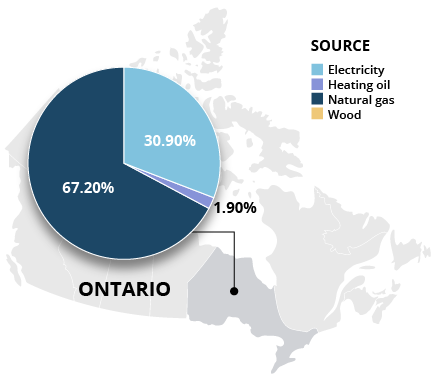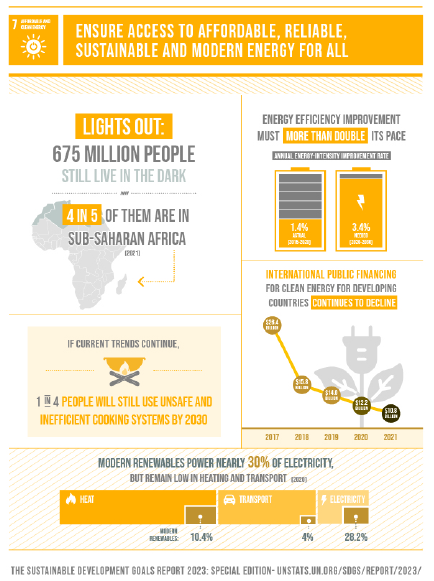Why Organizations Should be Transitioning Away from Natural Gas
Natural gas serves as a predominant energy source in Canada, primarily used for heating diverse establishments such as residential homes, industrial factories, and commercial buildings. According to the Canada Energy Regulator (CER), Ontario is one of a few provinces that relies heavily on natural gas as the main energy source used for heating (62.07%) followed by electricity (30.90%) and heating oil (1.90%).

The concern is that approximately 95% of natural gas is made of methane, which is the second most important greenhouse gas (GHG) generated by human activity – and the release of GHGs and their increasing concentrations in the atmosphere are having significant impacts on the environment, human health and the economy.[1]
As reported in this CBC News article, in 2019, buildings were the third largest source of greenhouse gas emissions in Canada with space and water heating representing about 85% of residential greenhouse gas emissions and 68% of commercial emissions. To reach net-zero emissions, drastically cut methane production and reduce greenhouse gas emissions, several Canadian jurisdictions have already implemented restrictions on fossil fuel heating.
- In January 2022, Vancouver implemented zero emissions regulations for all new low-rise residential buildings with space and water heating equipment. And, by 2025, all new replacement heating/hot water systems must be zero emissions.
- In Quebec, after 2023 it will be illegal to replace existing furnaces with natural gas-powered systems.
These kinds of regulations are expected to expand to other regions across the country as the Canadian government works to reach its emissions targets of 40% below 2005 levels by 2030 and net-zero by 2050.[2]
Natural gas made up 37.47% of Canada’s end-use energy demand in 2022. As part of its Energy Futures series, the CER’s interactive visualization tool projects that for Canada to reach their 2050 net-zero emissions target, end-use demand for natural gas will need to come down to 21.67%.
What Benefits Are There to Reducing the Demand for Natural Gas?
The formula is simple. Reducing natural gas consumption will reduce the amount of methane produced, thereby reducing greenhouse gas emissions and helping governments and organizations alike reach their Environmental, Social, and Governance (ESG) targets.
ESG is a new concept for many organizations and often, the cost associated with meeting environmental objectives is daunting. However, when approached strategically and logically, the long-term benefit of carbon cost avoidance due to transitioning to more sustainable forms of energy will be greater.
– Cory Slinger, Director, Business Development, Jupiter Energy Advisors Inc.

For organizations, transitioning to more sustainable forms of energy provides both economic and social benefits. For example, with the Federal Fuel Carbon Charge, natural gas costs will continue to climb until 2030, increasing the cost of using natural gas. Transitioning away from natural gas to more sustainable forms of energy or reducing your organization’s consumption of carbon-intense energy sources can help mitigate Federal Carbon Charges.
Furthermore, reducing your organization’s dependence on Natural Gas and shifting to less carbon-intensive forms of energy is in line with the United Nations Sustainable Development Goal #7 to ensure access to affordable, reliable, sustainable and modern energy for all.
As climate change continues to escalate, internal and external stakeholders are putting more and more importance on organizations’ business practices in relation to their environmental impact. Failure to demonstrate commitments to ESG-related topics such as carbon reduction can impact public relations and recruiting, and directly impact an organization’s finances.
Continued focus on moving to more sustainable energy can have several benefits. First, it will allow organizations to make and/or meet their emissions commitments toward a Net Zero future. These days, moving towards sustainability can have a major positive image enhancement and public relations impact as well as improve employee morale and in some cases, assist in attracting environmentally conscious top staff.
– Steve Schmidt, Vice President, Sales and Marketing, VIP Energy Services Inc.
[1] https://www.canada.ca/en/environment-climate-change/services/environmental-indicators/greenhouse-gas-concentrations.html
[2] https://www.canada.ca/en/services/environment/weather/climatechange/climate-plan/climate-plan-overview/emissions-reduction-2030/sector-overview.html#sector5
Return to Industry Spotlight: Focus on Natural Gas Management
